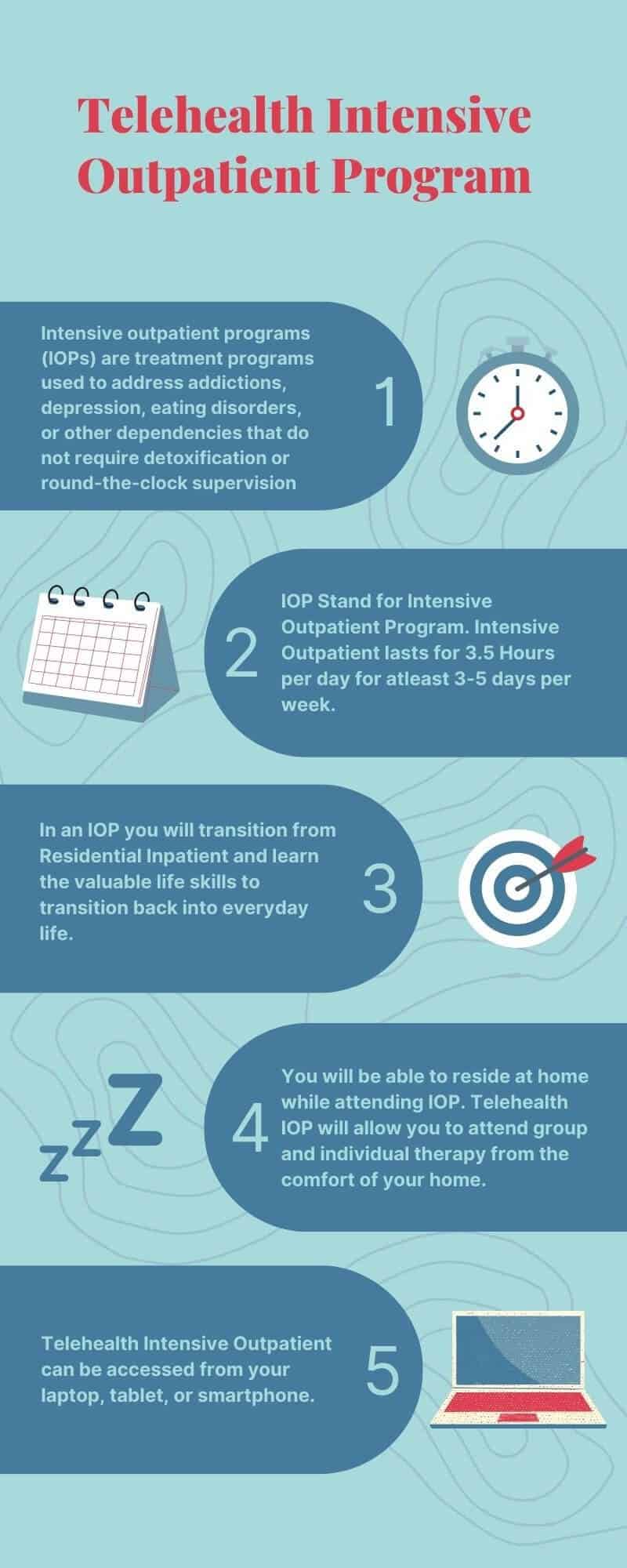Intensive Outpatient Program (IOP): An Adaptable Solution for Dependency Therapy.
Intensive Outpatient Program (IOP): An Adaptable Solution for Dependency Therapy.
Blog Article
Navigating the Complexities of Twin Diagnosis Treatment Within an Intensive Outpatient Program Setting
In the world of psychological health and addiction treatment, the junction of twin diagnosis offers a nuanced challenge that demands a thorough and tailored technique. Within the boundaries of an Extensive Outpatient Program (IOP) setting, the complexities of attending to co-occurring psychological health conditions and compound make use of problems require a delicate balance of knowledge and resources to navigate. The assimilation of evidence-based techniques, collaborative efforts among multidisciplinary teams, and a keen understanding of the special demands of each person are essential components in efficiently handling double diagnosis within an IOP framework. By discovering the details of twin medical diagnosis therapy within this extensive outpatient context, a more clear course emerges towards alternative and sustainable healing for those facing these intertwined difficulties.
Double Medical Diagnosis Introduction

Recognizing double diagnosis is crucial as it calls for a thorough and incorporated approach to treatment. By acknowledging the interplay in between material use and psychological health, healthcare carriers can tailor interventions to meet the one-of-a-kind needs of each individual. This all natural approach not only addresses signs yet also targets underlying variables that contribute to the double medical diagnosis.
Additionally, unattended dual diagnosis can cause a cycle of regression and intensifying mental health signs. By acknowledging the intricacy of dual diagnosis and offering specific treatment, medical care specialists can support individuals in accomplishing long-lasting healing and enhanced psychological wellness.
Tailored Therapy Strategies
Identifying the elaborate interaction between substance use disorders and mental health conditions, the growth of tailored treatment strategies is paramount in dealing with the complexities of dual diagnosis in psychological wellness therapy. Customized therapy plans are customized methods that think about the distinct needs, challenges, and objectives of people encountering dual diagnosis. These strategies are created collaboratively by a multidisciplinary team of professionals, consisting of psychoanalysts, psychologists, social workers, and addiction specialists, to guarantee extensive and integrated treatment.
Tailored therapy plans commonly entail a combination of therapies, medications, and behavioral interventions that target both the material usage disorder and the psychological wellness condition all at once. These strategies may include cognitive-behavioral therapy, dialectical behavior modification, medication-assisted therapy, individual counseling, team therapy, and family treatment, to name a few evidence-based treatments. By personalizing treatment techniques to private circumstances, customized plans can address the origin of double diagnosis, advertise long-lasting recuperation, and enhance total lifestyle for individuals dealing with co-occurring disorders.
Integrated Care Strategy
An integrated treatment method in twin medical diagnosis therapy integrates clinical, psychological, and social treatments to resolve the intricate demands of people with co-occurring substance usage problems and mental health problems. This technique recognizes that dealing with one aspect of a dual medical diagnosis without dealing with the various other can bring about ineffective results. By incorporating clinical treatments such as medication administration for psychological health conditions with emotional treatments like cognitive-behavioral therapy for substance use conditions, people obtain extensive care that news targets all aspects of their double medical diagnosis.
By integrating social treatments like household therapy, trade support, and area sources, the therapy ends up being much more all natural and tailored to the person's specific needs - Intensive Outpatient Program (IOP). Overall, an integrated care method in twin diagnosis therapy within an extensive outpatient program setup intends to give detailed, efficient, and customized treatment to individuals dealing with co-occurring disorders.
Obstacles in IOP Setting
In the context of double diagnosis therapy within an intensive outpatient program, navigating the intricacies of co-occurring material usage problems and mental wellness problems presents significant challenges. Among the key hurdles in the IOP setup is the coordination of care between mental health and wellness professionals and drug abuse specialists to make certain a detailed treatment technique. This requires efficient interaction, collaboration, and a deep understanding of exactly how these problems communicate and affect each various other.

Additionally, addressing stigma and resistance to therapy within the IOP setting can hinder progression. Some individuals may be reluctant to disclose their double medical diagnosis or may really feel embarrassed, hindering their interaction in the therapeutic process. Getting rid of these obstacles necessitates a helpful and non-judgmental setting that cultivates trust and openness.

Collaborative Professional Efforts
Efficient double his explanation diagnosis therapy in an extensive outpatient program demands smooth collaboration amongst psychological health professionals and compound abuse experts to make sure a comprehensive and integrated method to care (Intensive Outpatient Program (IOP)). This partnership is vital to resolve the intricate interaction in between mental health and wellness conditions and compound abuse, as both elements require to be treated concurrently for successful outcomes. Mental wellness specialists bring competence in identifying and dealing with psychological wellness conditions, while chemical abuse experts have specialized expertise in resolving dependency issues. By interacting, these specialists can produce individualized treatment strategies that deal with the unique demands of each client, considering both their psychological health and wellness and drug abuse obstacles.
Collective initiatives also expand to regular interaction and information sharing among group members to make sure a natural therapy technique. This may include instance seminars, joint sessions with the person, or shared paperwork to track progression and readjust treatment approaches as required. Read More Here In addition, cooperation may include entailing various other healthcare specialists such as health care medical professionals or family therapists to give alternative support to the patient. Inevitably, an unified front of professionals collaborating boosts the effectiveness of dual diagnosis treatment within an intensive outpatient program.
Conclusion
In conclusion, effective dual diagnosis therapy within an intensive outpatient program setting needs customized therapy plans and an integrated care approach. Challenges might emerge in this setup, yet joint initiatives among professionals can aid browse these complexities. By attending to the distinct needs of individuals with co-occurring psychological health and wellness and compound use problems, IOP programs can supply detailed and alternative like support recuperation and general well-being.
Report this page